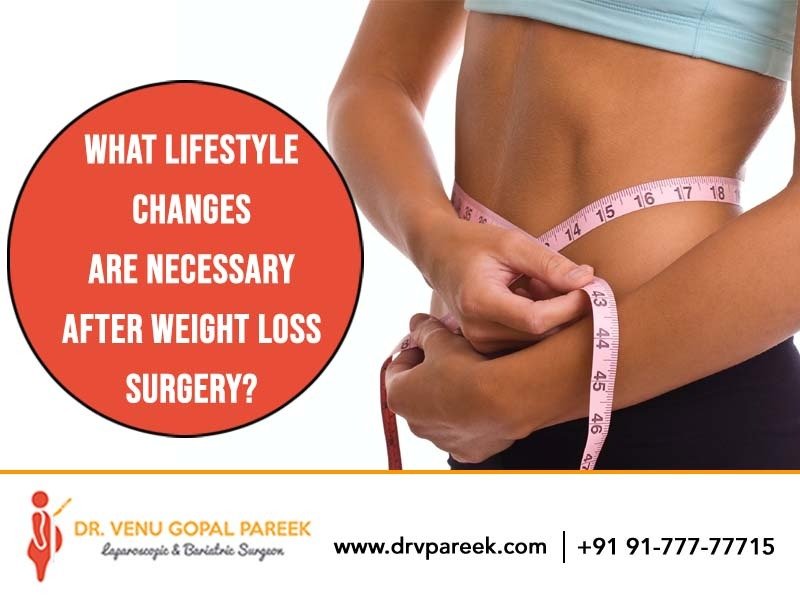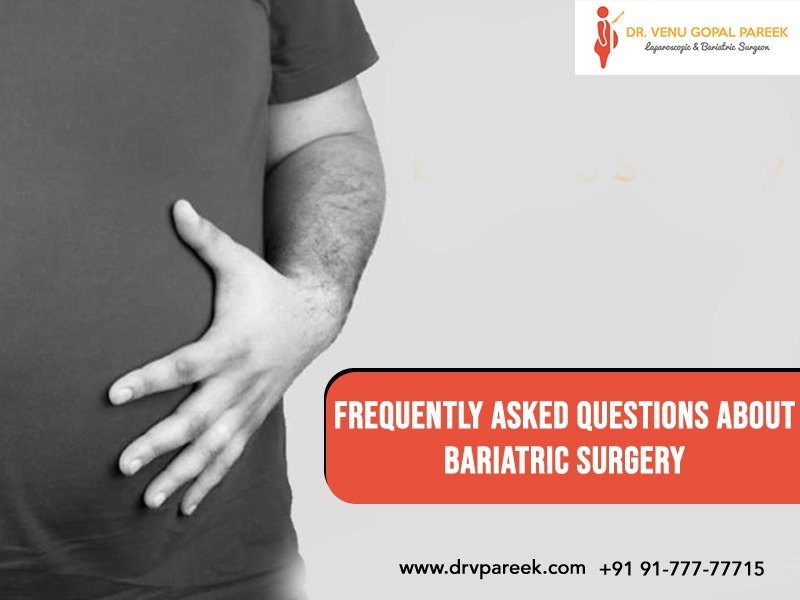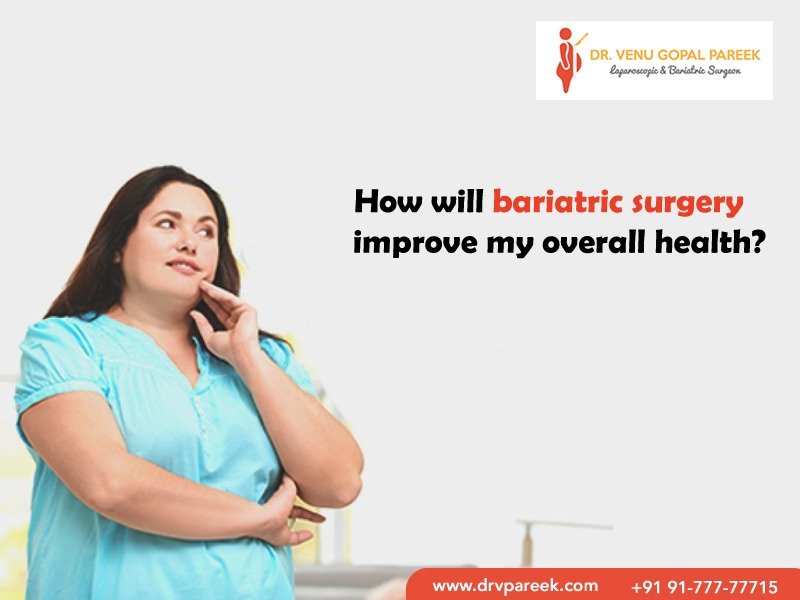
What Lifestyle Changes Are Necessary After Weight Loss Surgery?
If one is committed to lead a healthy lifestyle, there are numerous avenues to help with that—all it takes is a determined thought from you. Being overweight and obese has become a silent pandemic all over the world. At the same time, there is so much advancement in weight loss, especially Bariatric Surgery. For individuals with BMI’s (Body Mass Index) higher than 30, weight loss surgery is a sweet song.
For the last 17 years, more than 1000 patients have put their trust in Dr VenuGopal Pareek to get back to a healthy weight. Dr Pareek says that “Bariatric surgery is a solution for those who are overweight and cannot lose weight by modifying diet or through exercise, and who have health complications due to obesity. But maintaining a healthy lifestyle post-surgery is equally important.”
Good, you had your surgery !!! You have lost considerable weight and are feeling light and healthy. What next? How do you maintain the same lightness and stay fit and healthy in the long run? That’s what this blog will tell you.
Lifestyle changes after weight loss surgery
Obesity treatment is more than surgery. Patients are expected to adopt a modified lifestyle in all aspects like diet, exercise, and regular follow-ups with their surgeon. Such a wholesome approach offers the best chance for success and prevents weight regain and recurrence of health issues. Let us look at all aspects in detail.
Diet Journey
Immediately after the surgery, your surgeon will prescribe a special diet. It starts with a liquid diet for a few weeks, then soft foods and eventually solid foods. The first few days, you are given clear liquids, and once the stomach adjusts to that, you can have sugarless juice, skim milk, decaffeinated tea or coffee, vegetable broth. More fluid intake is highly recommended soon after surgery to avoid constipation, fatigue and nausea.
After a week of liquid diet, you can start with pureed foods. You can choose from soft fruits, cooked vegetables and strained cream soups. Their consistency should be like a smooth paste or thick liquid. You can eat three to six small meals every day consisting of 4 to 6 tablespoons of soft food. Spend a minimum of 30 minutes on each meal.

After a few weeks, you can shift to easily digestible small, tender and easily chewable foods. Chew for a longer time until the food becomes a purée before swallowing. Patients can opt for cooked rice, cereal, eggs, cooked vegetables, fruits etc.
Protein intake is highly recommended as compared to carbohydrates. If sufficient protein is not taken, it causes muscle loss and weakness. Solid foods are started around 8 weeks after the surgery, as per your surgeon’s recommendation.
Remember that most weight loss surgeries focus on reducing the size of the stomach. Hence, it is essential to change your eating habits accordingly.
- Eat and drink slowly and chew longer
- Have small portions of healthy meals
- Drink plenty of liquids
- High protein intake is a must.
- Avoid fatty and sugary foods.
- Take prescribes vitamins and minerals regularly. Multivitamins, Vitamin B12, Calcium, Vitamin D, and Iron are usually prescribed.
Make exercise part of your post-surgical life.
You are pleased with your weight loss after the surgery, but how to maintain it? “Exercise” is the primary key. Regular exercise promotes blood circulation and surgical wound healing. Initially, for a week, try walking and take several short walks per day. In Laparoscopic surgery, one can do most regular activities in two to four weeks, and in open surgery, it takes up to 12 weeks. The best types of exercise are swimming, cycling and walking. Once the surgical wounds are healed, try yoga, dancing, jogging, aerobics classes and light weights after consulting your surgeon. Heavy lifting must be avoided for at least a month and should be started only if your surgeon gives a go-ahead.
Altered Medication
Medications are either decreased or stopped after weight loss surgery. The doctors might also alter your existing medicines to liquid form or chewable form. After weight loss surgery, many medicines that you were taking for pre-weight loss health issues may no longer be required. Your bariatric surgeon and the treating doctor will take this decision together. If the patients are taking extended-release drugs, their form or dosage is changed. This is done because your new digestive system cannot immediately absorb the medication as before. Antacids are also given after the surgery. Avoid non-steroidal anti-inflammatory drugs (NSAIDs) such as aspirin, ibuprofen, etc., since they increase the risk of developing ulcers. If you have to start any new medication, please consult your surgeon first.
Smoking and Alcohol

Nicotine in tobacco reduces the healing ability of the body. Hence, smoking must be stopped even before going into surgery. It puts the patient at the risk of heart attack, pneumonia and blood clots immediately after surgery. Consumption of alcohol after bariatric surgery has serious consequences. After the surgery, alcohol absorption increases. The patient will have higher alcohol levels in their system for a more extended period after drinking than before surgery. However, quitting can be very difficult for some, so work with your doctors and acquire tools to help you with this. Remember, you are getting weight loss surgery to stay healthy, so if you start smoking and alcohol again, it negates the purpose of the surgery.
Pregnancy
Women who underwent weight-loss surgery must wait for at least 12 to 18 months and then try for pregnancy. You will achieve your lowest possible weight within this period, and the body gains adequate nutrition to ensure a healthy pregnancy. Due to your reduced weight, the chances of pregnancy increase.
Regular follow-ups
Within the first year, follow-ups are done every few months. Once a year, long term follow up is a must. Since obesity is a chronic disease, time and time, you should take proper advice and guidance from your surgeon so that it does not recur.
You would have invested considerable time and money for your weight loss surgery. Changing your lifestyle is part of your weight loss journey. Our distinguished Bariatric and Laparoscopic surgeon, Dr VenuGopal Pareek, believes in giving continued support and counselling to the patient even after the surgery. You can reach us easily at 91-777-77715 or drvenupareek@gmail.com.







